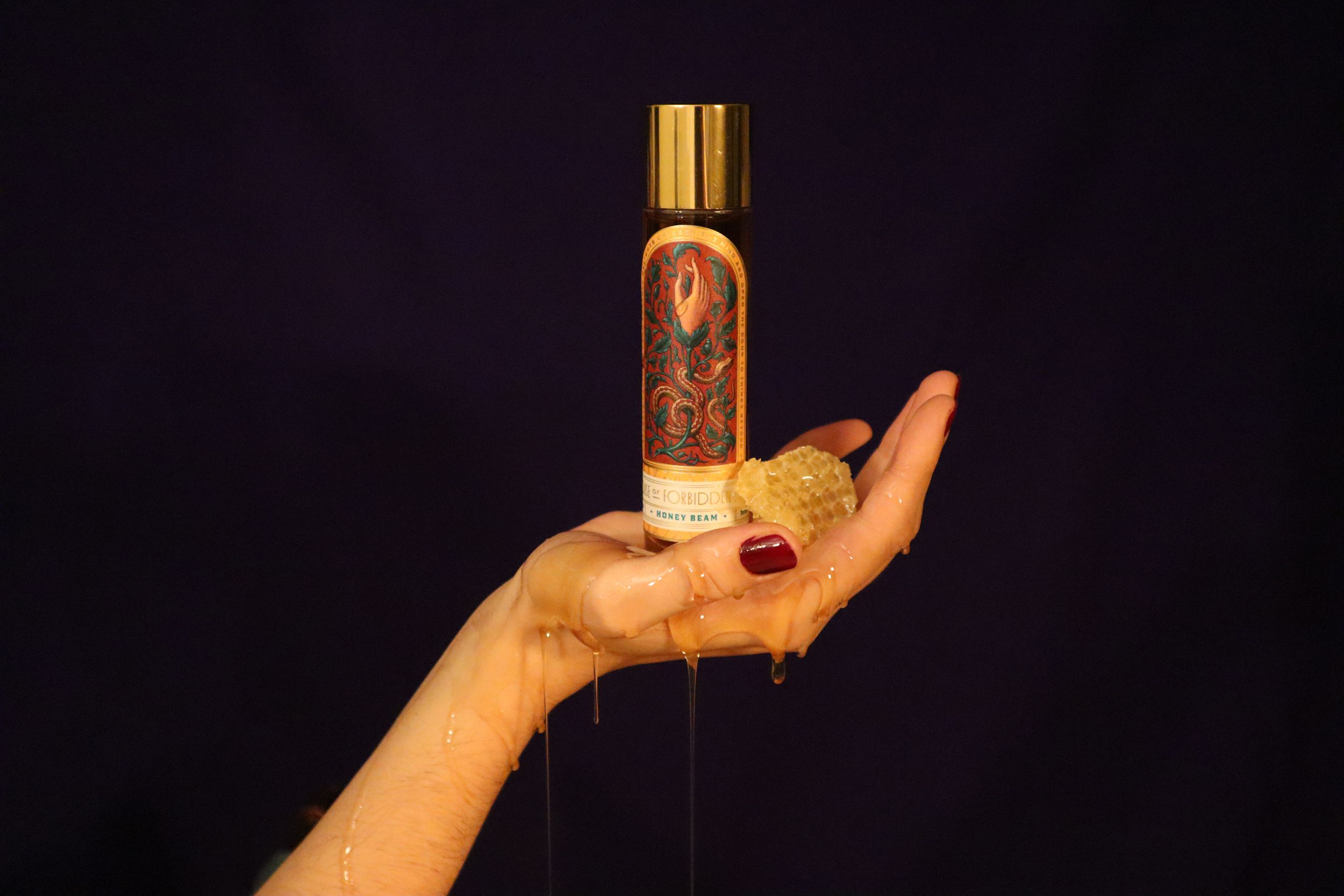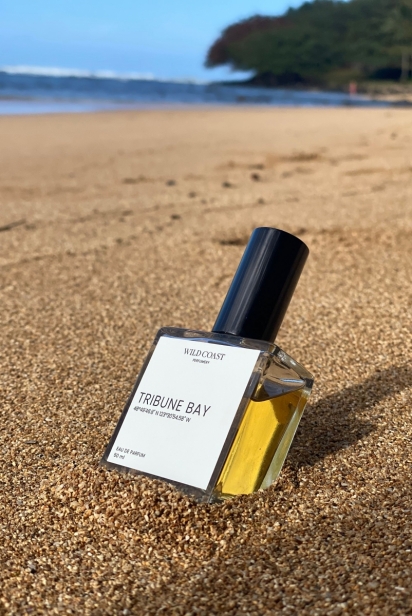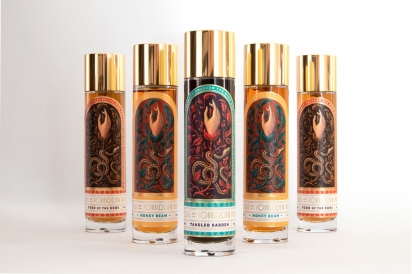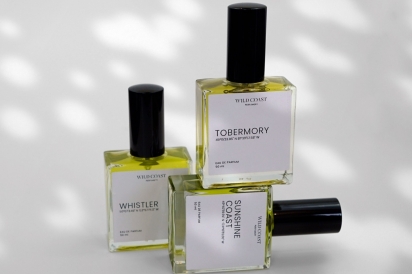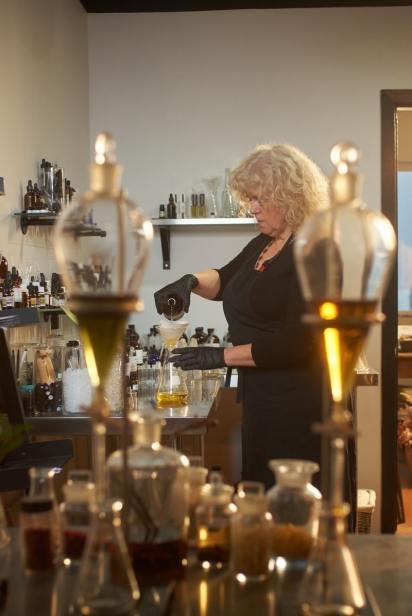Nature’s Essence
Perfume is a little bit magical. It transports us to faraway lands on exotic clouds of neroli, vanilla, sandalwood or jasmine. But it also reminds us of home, of the garden after a rain or a baby’s velvet cheek. Its history is entangled with alchemy and ritual, its language that of music and wine, its purpose to heal, intrigue, incite and, above all, to remember.
“I’ve got lots of memories tied to scent,” says Laurie Arbuthnot, owner of Wild Coast Perfumery in Cowichan Bay. “To capture the scent of a place can mean so much to a person. I’ve actually had people crying in the shop because a perfume reminded them of a person or a place.” Today, Arbuthnot is just one of a growing number of Island perfumers, all of them trying to capture nature’s fragrant magic in a bottle.
In love with fragrance
In 1986, Arbuthnot was traveling in Italy, on the island of Capri, when she stumbled into the Carthusia perfumery, which makes natural perfumes from recipes that date back to 1380. She recalls, “When I left, I thought, I want to do this.”
It took her nearly 30 years to do it, though. Meanwhile, she learned aromatherapy and herbology from old textbooks, until she found a teacher in herbalist Jeanne Rose in Berkeley, California. “And then I thought I was ready to do something on my own,” she says. Arbuthnot now has 13 fragrances, most named for local places, like the Tribune Bay that won first prize at the 2021 Clean Beauty Awards.
Karen Van Dyck, on the other hand, was already in her 40s when she fell in love with fragrance. “I was sitting by the lake with my baby in my arms and I could smell that cottonwood smell, that spring smell, and I started thinking about putting it in a bottle,” she recalls.
She turned her kitchen into a lab and became an herbalist, making tinctures and teas, and also found an instructor in Berkeley—Mandy Aftel. Van Dyck was operating out of a Victoria health food store when she met Stacey Moore, who had launched her brand Flore in 2016. “Before that,” Moore says, “I’d always been a sensualist, and scent was always a way for me to escape when I was younger.” In 2018, the two opened The Still Room in Oak Bay, where they sell skin care products and perfume under their own brands as well as their joint one.
Meanwhile, Palma Cafolla discovered natural perfume as a 17-year-old working as a florist in London, and opened her Victoria store Zingaro Floral Perfumery in 2021. “I always admired botanicals and came to realize that nothing smelled real,” she says. “I was very intrigued to transport the beauty of nature through perfume.”
And in Parksville, newcomer Megan Terpening has just launched her first fragrance, Tangled Garden, under her House of Forbidden Fruit label with its gloriously decadent artwork created by Chad Michael Studio. Until she discovered natural perfumes, Terpening says, “I was interested in plants, more for cooking and what you can grow in your garden.”
Like food and wine
Talk to perfumers for any length of time and you might think you’re actually discussing music and food and wine.
“Perfume has a lot of similarities to music,” says Terpening. “There’s a top note you smell first, then there’s the middle note that fades into a base note.” Blends of notes are known as an accord, and the final creation is akin to a symphony. And when crafting a fragrance, a perfumer sits before a perfume organ, a semi-circular desk with stepped, curved shelves that hold bottles of their raw materials.
But even more than music, perfume, especially natural perfume, is linked to food and wine. After all, as Van Dyck says, “There’s no flavour without aroma. You can’t connect to the essential things in life.” Indeed, scientists believe that 75–90% of what we perceive as “taste” is actually smell.
“Food is all about aromas, herbs and spices and the process as well,” adds Arbuthnot. “Natural perfumes are not unlike wine. They are made from nature and evolve with age, allowing beautiful nuances to unfold. Natural perfumes are blended to allow layers of fragrant notes to unfold on a person’s skin.”
Natural perfumers are also alchemists, using distillation since medieval times to extract the spirit of plants (known as hydrosols) to nourish body and soul with fragrance, flavour and health benefits. As Van Dyck says, “They knew these aromatics were the water of life. They provided food and protection. Because we are alchemists, we translate things and we wildcraft things that we grow and gather.”
Local connections
Although all these perfumers live on Vancouver Island, they rarely use local ingredients in their perfumes. Instead, they import their essential oils, resin, absolutes and other raw materials. That’s because, aside from fir and balsam essences, they are not produced in a large enough quantity here for their needs—and what little is available is prohibitively expensive.
Moore is one perfumer who extracts her own spirit waters from botanicals she grows or wildcrafts. “It’s so special to use things that are around us and we’re connected to,” she says. “I love to make ritual perfumes. People need to find ways of finding pleasure in the world.”
And what could be more pleasurable than a beautiful fragrance? As Arbuthnot says, “As we all know now that ‘forest bathing’ is good for us, natural perfumes allow us in the same way to reconnect with nature and just make us happy in the most basic way.”
She adds, “A perfume can raise so many memories and emotions. That’s why we’re so attracted to scent.”


